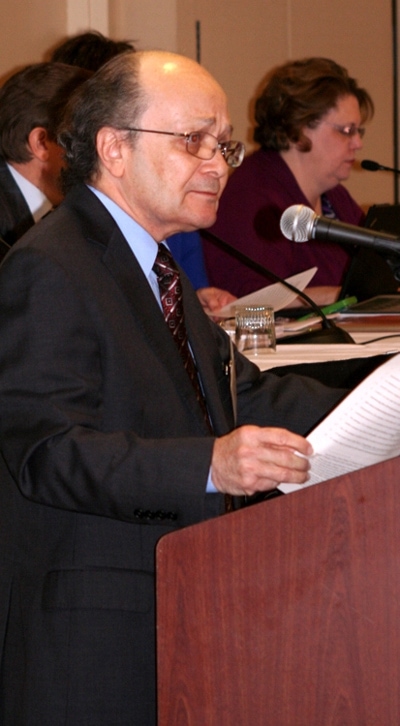
BY ADVENTIST REVIEW STAFF
“It’s a pity we can’t harness some of the heat generated in
our committee room,” laughed one member of the Theology of Ordination Study
Committee as outside temperatures hovered in the single digits. “We could probably warm most of central
Maryland.”
The fourth day of the TOSC meetings in Columbia, 10 miles
from the General Conference building, featured summary presentations of key
theological presentations given during the January 21-25 commission, as well as
sketches of possible outcomes for a world church trying to move unitedly on the
matter of ordination. OVERVIEW BY ANGEL: Retired Biblical Research Institute director Angel Rodriguez offered a summary response to those opposing the ordination of women." style="font-size: 15px; float: left;" class="img-left">
OVERVIEW BY ANGEL: Retired Biblical Research Institute director Angel Rodriguez offered a summary response to those opposing the ordination of women." style="font-size: 15px; float: left;" class="img-left">
Earlier sessions on Wednesday and Thursday afternoons
generated increasingly candid assessments of the differing positions. Several presenters critiqued the interpretive
methods used by those in favor of ordaining women to gospel ministry, and were
met by challenging queries during scheduled question-and-answer sessions. Major points of difference included the topic
of male headship as a Biblical imperative; the apostle Paul’s description of
the ordained leader as “husband of one wife” (I Timothy 3:2); and the belief by
several presenters that theological consistency requires the church to reverse
its current position and no longer ordain women even as local congregational
elders.
“These meetings have featured frank—even very
frank—descriptions of the positions on both sides of this matter,” said Artur
Stele, chair of the TOSC and director of the church’s Biblical Research
Institute. “At times, we’ve had to
caution each other about the temptation to describe the hermeneutics of those
we differ from as impermissible or unbiblical.
I believe that everyone who has participated in this process has come
with a genuine desire to find out what the Word of God teaches, and how we can
identify solutions that allow the church to stay focused on its worldwide
mission. I’ve been gratified to see a
growing sense of camaraderie and understanding as we’ve move through this
process.”
The five-day event has also allotted generous time for small
group discussions, with specific Bible passages as the focus of the
conversation. More than eight hours in total were designated
to discuss the Creation account of the creation of man and woman (Genesis 1-3);
Paul’s counsel to Timothy about the behavior of women in worship (1 Tim
2:12-14, I Cor 11); the apostle’s “neither male nor female” description of what
it means to be “in Christ” (Gal 3:28); and the application of the prophecy of Joel
2:28-32 to the contemporary church.
Friday’s schedule also gave time for looking ahead. Barry Oliver, president of the South Pacific
Division, shared a vision about how a possible decision to ordain women to
gospel ministry might be received by the world membership, while C. Raymond
Holmes, retired associate dean of the SDA Theological Seminary, urged TOSC
members to maintain the church’s current position.
On Friday evening, TOSC members will hear a musical concert
presented by members of the Baltimore First Seventh-day Adventist Church in
Ellicott City, Maryland, and a vesper message from TOSC chair Artur Stele.
Evangelist Mark Finley, assistant to the General Conference president,
will lead in a Sabbath morning program focused on understanding the mission and
methods of the first-century Christian Church as described in the Book of Acts. DIGGING DEEP: Mark Finley, longtime evangelist and editor-at-large for the Adventist Review, pores over a Bible passage during a TOSC presentation." style="font-size: 15px; float: right;" class="img-right">
DIGGING DEEP: Mark Finley, longtime evangelist and editor-at-large for the Adventist Review, pores over a Bible passage during a TOSC presentation." style="font-size: 15px; float: right;" class="img-right">
“This TOSC experience is in some sense a civics lesson for
Adventist theology and those who care about it,” said Bill Knott, editor of the
Adventist Review and Adventist World magazines, and a member
of the TOSC. “The announced topics are understanding
the Biblical teaching about ordination and whether that status should be conferred
on qualified female leaders. But at
least as important are the lessons we are learning about mutual respect,
careful descriptions of those with whom we differ, and the necessity of
trusting that the Spirit is at work in other Adventist lives.”
The 103 members of the Theology of Ordination Study
Committee hail from each of the church’s 13 world divisions, and include
representatives of the church’s educational system, administration, pastoral
ministry, laypersons and supporting ministries.
A fourth and final week of meetings is scheduled
for June 2014. TOSC leaders expect to
develop recommendations in June for the October 2014 Annual Council of the
General Conference Executive Committee.
That group decides what items to recommend for the agenda of the 2015
quinquennial General Conference session.